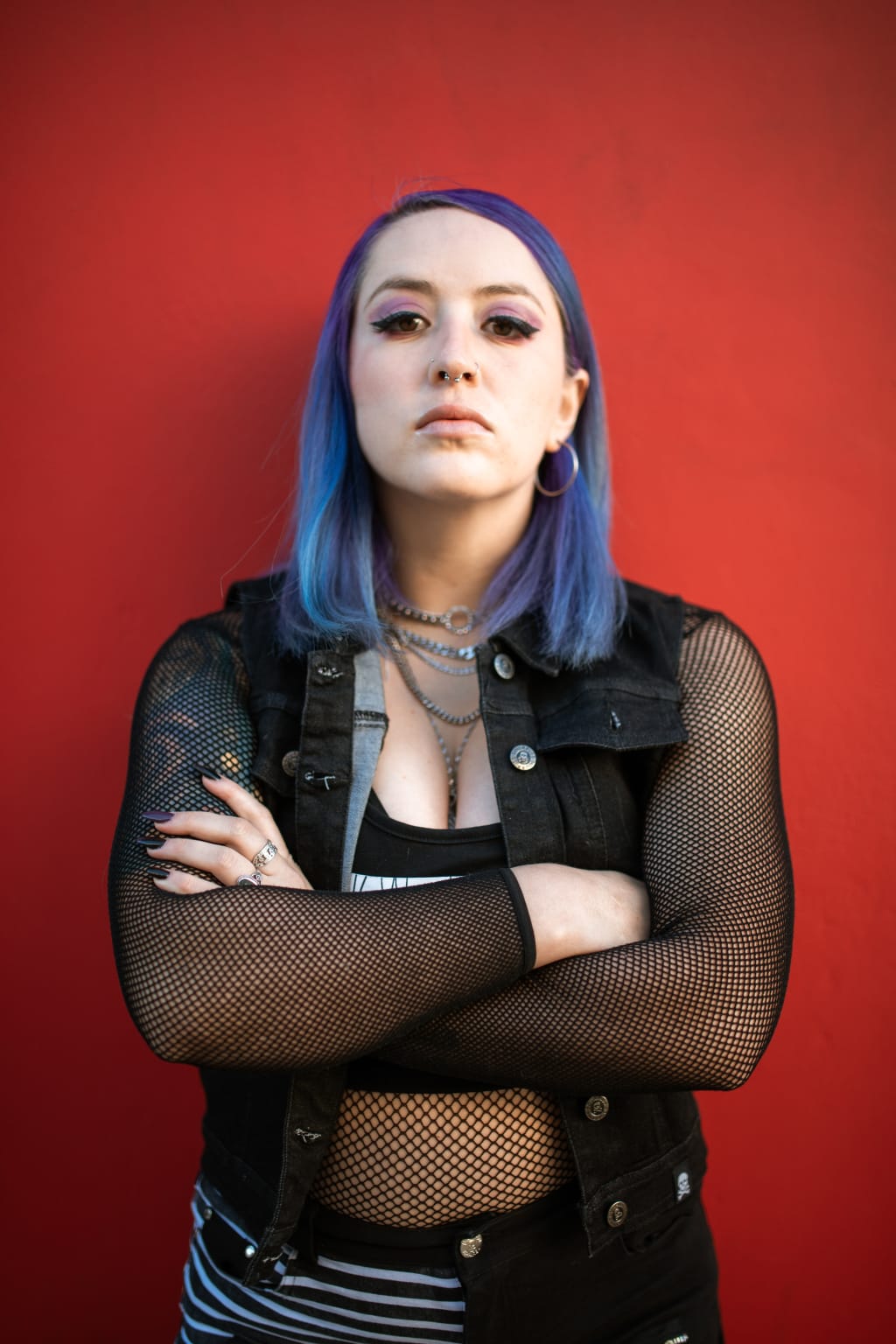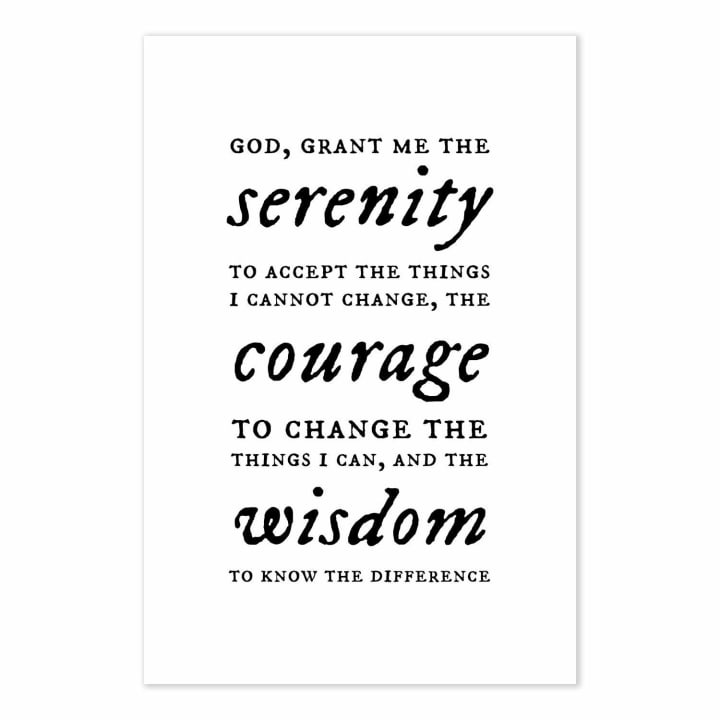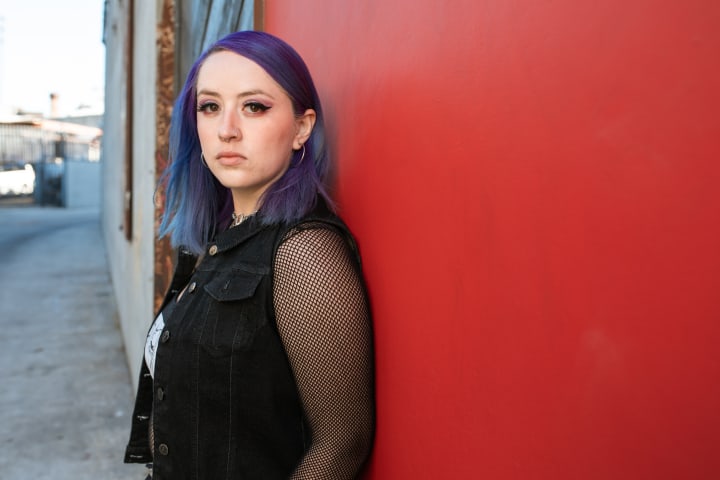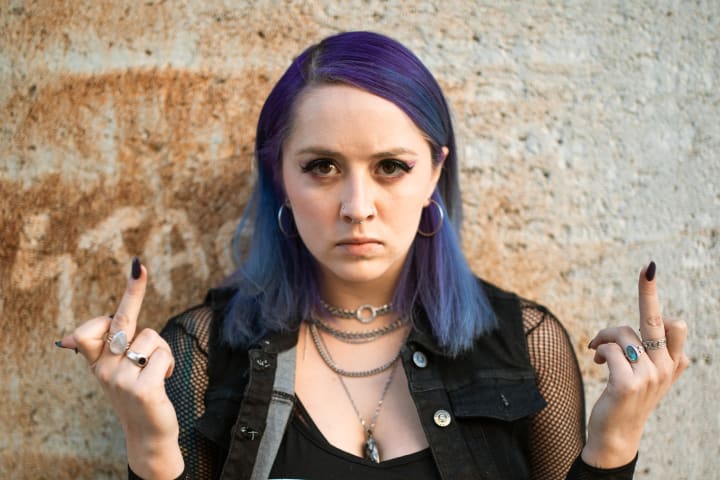Why I use the A word instead of the F word.
What I wish I knew then that I know now.

For years I was burdened by the F word and just could not get myself to use it. I hated the word. I could not wrap my head around why so many people insisted it was the only way for me to feel better or embrace my higher self.
I now know that generational trauma and organized religion greatly influenced the concept. It makes sense in many scenarios to use the F word. But hear me out. It should not be forced on a trauma survivor to use. Not when it comes to how they cope with the aftermath of abuse or how they should feel about their abuser.
I wish I could go back in time to many younger versions of myself to tell her that she does not have to concern herself with the word "forgive" (or forgiveness).
I was first abused by my own parents, who were addicts when they had me, and have continued for my 31 years of life to stay in that condition. They were volatile, cruel, and violent towards me and others. I never had actual parents to teach me, support me, love me, or encourage me. I was an only child living just to survive each year until I was 16 and finally left.
I have been no-contact for a few years now and the major catalyst for finally going no-contact was surrendering to another word.
Acceptance.
It's funny how in AA people with addictions are taught about acceptance in the serenity prayer, but survivors of abuse are completely gas lit and scolded to forgive their abusers.
I do not speak for everyone else's experiences and I do not speak badly against people with addictions, mental health conditions, or psychological problems in this piece. I am just asking my readers to explore these social constructs, the language that gets used, and how people in society get treated based on their life situations.

I was told by many teachers, social workers, therapists, and adults in my life that I needed to "forgive" my parents. They wanted me to forgive my abusive exes (plural). My rapists. The man who lied about his age and assaulted me in a motel where no one knew I was located and then dumped me off to find my own way home after.
For years, all these providers and professionals told me to recall my past events and then find forgiveness in my heart. So I tried to really seek out the F word. I wanted to empathize with my abusers. That was supposed to be the way through the pain. The way out so I could heal.
I asked myself what was wrong with me so many times because as I engaged with some of these abusive people, including my parents, I could not find even an ounce of remorse or reasoning from them. I could find no way to forgive them. The F word was useless.
I was not talked to about the things that I now know help trauma survivors actually heal.
I was fed so much about how my parents being really abusive emotionally, psychologically, and physically was out of anyone's control. How it was this awful thing that just happened.
I was told it is important to have faith, love, and forgiveness in my heart. And while I prefer not to share my agnostic beliefs in my written work (or here on vocal), I will say that it just did not help me to process my past at all.
I believed in fairness.
I believed in love.
I believed in healthy conversations and relationships.
I knew my abusers did not have any of those same beliefs or life skills. I was sure that none of them were capable of having a healthy conversation about the past. None of them were going to ever earn my forgiveness for free.

"It will help you to forgive them" and "forgive them anyway," they said.
I just could not for the life of me adopt the notion that forgiveness would help me. It explained nothing. It made me feel nothing. But I did it anyway.
I finally gave in and told each parent I forgave them. Separately and in different ways, I told them each that I forgave them. It kept me in touch with them for another year or so after that. I had supposedly "finally" released the burdens of the past and the pain of going through trauma.
And yet, I hated them. I hated them because as soon as I used the F word to each of them, they used it as a window in. Into my life. Into my mind. Into my progress as a person. I felt burdened and angry with the empty conversations we had after that.
So I tried harder... I messaged other abusers from my past looking to forgive them. Looking to talk about what had happened.
"Hey... it's been a while. How have you been? I hope well. Listen, I just wanted to tell you that I forgive you. I forgive the way it ended and how you left off with me. I forgive you for what you said."
Maybe if I had a nice tone... Maybe if I prayed ( like talking to myself in the shower with my hands folded and my eyes shut real tight. Hoping if I squinted hard enough, that prayer would get lifted somewhere off into the universe... but that text was left on read.
When I heard back from a few of those people or got responses from my parents, I hoped so much that it would clear the air and give me some understanding. I was desperately searching for a keyword or moment to finally make it all click. Oh, that's why you did that. Okay. I forgive you.
But to no avail that F word just kept disappointing me. It gave me no peace. It gave me so much more to feel traumatized about.

What I would tell 25 year old me is that he was not sorry and I did not have to forgive him.
What I now know at 31 is that the F word was never necessary at all. Sure, the concept of forgiveness has substance to it. But there are times it is just completely useless. Not even needed.
I now know I could have used the A word all along.
Acceptance.
Not just "I am going to accept that my parents abused me and that there is no way to have a healthy relationship." That is just surface level A.
The real depth ... I now can accept what happened because I have been educated in what actually happened.
Suddenly it's like someone hit rewind. I can see this rewound time warp traveling back through each prior age.. all the traumatic moments, all the abuse, all the people who hurt me.. all those moments showing me something from a completely new perspective.
It happened because _______.
I have finally learned why my parents did what they did and I know they are fully incapable of apologizing or saying anything coherent. I know my father is sociopathic in addition to the mental conditions, numerous overdoses, brain damage, and internal organ damage. I know my father is never going to be able to say anything at all about what he did to me.
Chasing forgiveness and the concept of forgiving him still does not apply. Having told him I forgave him at one point did nothing for him or myself. In fact, similarly to what I experienced with my mother, the conversations had been very incoherent and soon forgotten.
On top of it, the addictions and blackouts my parents had made it impossible for them to have been responsible in those moments for their actions. It was not possible for them to GRASP what they had done, how bad or how often the abuse was, or how it hurt me.
When I had ever brought it up, they each had denied so many HARD FACTS that I remembered but they said never happened.
It was not just a question of my faith but my sanity to scramble to forgive them. It felt illogical for me to do so.

My narcissistic ex had not been sorry, was still doing the same abusive things to other women, and had no remorse at all for it. But his own list of unmanaged and disassociated trauma was miles long.
This did not make it easier to forgive him either. I just took forgiveness off the table for everyone.
ACCEPTANCE.
Acceptance comes from being educated, having powerful conversations, and making new connections in the brain. It comes from really pulling apart the trauma through an intellectual and psychological lens.
It also is essential to work with a professional who is trauma trained and up to date on mental health & trauma terms. It is essential to have an adult talk with you who comprehends these things like they are obvious. No professional should ever be choking your feelings out with the word forgiveness.
If you want to go ahead and forgive someone, you can do so. BUT it has nothing to do with understanding the what, why, or how. It is not the first stop on the healing train, nor should it be.
There is so much more you need to know and understand about the things you went through.
I really needed someone to explain to me that what my parents did was not my fault. I needed someone to tell me that the boyfriends and strangers who abused me did not do it to me because I was too much or not enough. I had not earned any of it. And forgiving them was far from the thing I needed to focus on.
I now know that whether or not I forgive someone, I can accept the things that happened to have been out of my control completely.
Could I have handled some situations, relationships, and interactions differently to have a safer outcome? Maybe. But probably not.
I was not educated enough about sex, boundaries, personal safety, personal space, my own preferences, or how to handle volatile situations. I was not taught the difference between consensual, or non-consensual. Worse. I was not taught that I could say no. Or change my mind.
I was not taught I could report the people who raised me. It did not feel smart to "bite the hand that fed me".
I was not taught that alcohol and drugs could cause people to do things and then not remember them. That people could say it never happened because to them, it didn't.
I was not taught that someone who is sociopathic will not be feeling any empathy or remorse. But worse, I did not know the red flags early into dating that someone was emotionally unhealthy or even void.
All those years... all those things I did not know.
So now I empower myself to constantly learn. To ask questions. To speak out.
I show up speaking up about everything. I analyze my past. I revisit these old events, but with this new lens.
I do not ask anyone "why" after they wronged me with the hope of some answer to justify it.
Abuse is abuse.
I wish I could send this message to everyone around the world. In different languages and in different ways. I want everyone to know that healing from trauma is not linear. But there are tools at hand that can save you years of agony.
You get to read, listen to, write about, and ask about mental health and trauma whenever you want to. Go subscribe to blogs, podcasts, and audible. Go download books. Go read Vocal + writer accounts like mine.
EDUCATE yourself on the reasons behind why things happened. Your whole view of life and the world will dramatically expand.
Those pains you carry from your own parent or past partner, old friend, or an abuser in your past... those pains subside when you develop an understanding and can evaluate your own life with that knowledge.
Understand that even though you cannot change the past, you can mold your future. You can seek help, support, a trauma-informed therapist or coach, and a strategy for healing that allows you to expand as a person.
YOU get to be happy and healthy at the end of this, whether you forgive someone or not. Empowering yourself with the right tools and mindset will make all the difference.
____________________________________
Bonus Writing Prompts:
1. Have you ever forgiven someone for hurting you and their response (or lack of) was really hurtful? Looking back, how can you reframe that interaction. What would you have done or said differently?
2. Pick one event in your past where you were too young to understand what was happening. Knowing what you know now about life and that situation, write out a letter to your younger self giving yourself the love and advice you wish you had heard from someone at the time.
3. What is the worst advice you ever got from a therapist, social worker, or support person in your life when talking about trauma? What is the most ignorant or hurtful thing a professional said that just stuck with you?
4. Do you have someone from your past who never owned up or admitted what they did to you? Write about this person, making clear statements to describe the why behind that. Ex. "This person could not (or would not) have admitted (or confessed) because they were incapable / incoherent / not sorry / not rational / not healthy / not mature etc. "

About the Creator
Jaded Savior Blog
Mental Health Blogger, Content Creator, and Creative Writer. I write about trauma, mental health, and identity. I love to connect with and support other Trauma survivors + Neurodivergent Creators! (@neurodivergentrising on Tiktok)






Comments
There are no comments for this story
Be the first to respond and start the conversation.